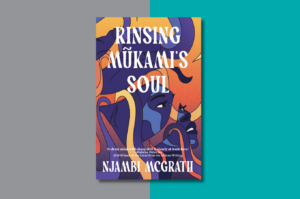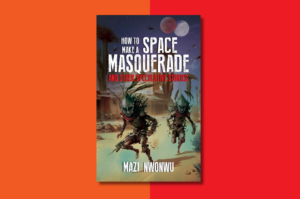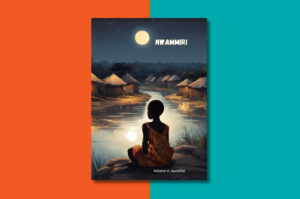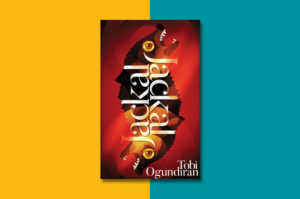
THOMAS
“Blessed are they that have not seen and yet have believed.”
– Jesus, in John 20:29
There’s a story Nigerians know and pass on with the conviction reserved for Holy Communion bread. Here, a slice of our history: we don’t lose unless something happens; unless there’s foul play. Here: an extra source to cite when defending our collective arrogance. It’s the story of that football match where Nigeria played against India and India scored 99 goals against Nigeria’s 1. Most Nigerians remember this match, whether they were born at the time or not; know the story like they know God-with a fervent, fastidious faith. No need to question it, or search for it, or relive it. It’s a story that happens to you once and then lives with you forever.
Throughout the full ninety minutes of the match, Nigeria’s players did their best, as Nigerians do; sprightly on their feet and quick to react, just as their coach had taught them. But something kept happening: Every time one of the players went near the ball, it morphed into something else. Some say it was a lion that came roaring into the air, all hungry-mouthed and thirsty-eyed; some say it was a snake uncoiling itself from the dead leather; others say it was both interchangeably. The rest claim that the match was only confusing because the ball kept on doubling, or tripling, and Nigeria’s goalkeeper found it impossible to know which one to focus on. The latter was what Thomas’s uncle claimed.
“That day? Ha! The whole Nigeria went haywire! The country was vibrating with shock. A whole us? Lose to India? India? One of our players even died. I forget his name now. One Samuel, abi Simon something, dropped dead on the field from a heart attack. People had so much anger in them that they poured into the streets and started to fight each other. Strangers who’d never met before in their lives o, lunging at each other, trying to draw blood. But in the end, many people made friends that day.”
Thomas could see the streets as his Uncle Anjos spoke, people grappling mercilessly, butting heads like rams, like they had nothing to lose: women on the sidelines picking fights with each other, children following suit. None of it was done with malice, or directionlessly. It was for a purpose. Everybody outside was trying to prove the same thing to themselves and everyone else: We’re a strong and talented people; it’s not that we were not ready, they insisted, it’s just that India used juju to confuse our players. They would never have won if they didn’t use juju. If one of us beats the other here, we can show each other we’re still strong. They fought to exhaustion, then hugged and shook hands before heading off together, asking: “So what was that your name again?” Some joked about it: “My name is Yusuf. But guy, you beat the hell out of me wallahi,” and got placating replies: “Sorry, my brother, you know we did what we had to do.” And they did.
After that match, India was banned from playing international football. It’s hard to know the year, but it’s a fact. It really happened. Everybody saw it. After all, what’s the alternative: That an entire country had a choreographed hallucination? A nationwide delusion?
Exactly.
Thomas knew animal stories too. He knew that tortoises had cracked shells as punishment for their unrepentant greed, from when they were dropped from heaven on their backs by a tired God. For all their haste, God had decided to delay them as a lesson. Hyenas sounded the way they did because they were found gossiping among themselves during a meeting in heaven which ended with God turning to them and saying in a bitter voice: Oh, you want to laugh? You will keep laughing forever. To Thomas, all this was believable because he had read Genesis, which made it clear how God felt about disobedience. A moment in time could lead to punishments forever. God seemed to love forevers.
But the stories Thomas loved the most were the ones about humans; stories that could still be happening right right now in the world as his uncle spoke. Still just a young teenager in secondary school, there was little else to do, so apart from serving God, Thomas had made it his life’s purpose to stack stories, to hunt and squash the fear that came with them.
Every evening, his uncle told him tales by moonlight. A genius with four degrees under his belt, Uncle Anjos wore his belt tightly. Thomas enjoyed horror because it added speed to his breathing and a sheen to his heart. Sometimes he dissolved into the words as Uncle Anjos was talking, fading off in the middle of a sentence, going somewhere new on the wing of a detail with his mouth ajar.
Like Thomas, when Anjos was a boy, he studied old stories from before the country earned its name, from way before the land was taken and way way way before it had to be wrested out of white hands. He filled notebooks with true and frightening realities he’d gathered from his grandparents. His peers couldn’t bear them; there had been enough bloodshed, enough loss, too much grief behind, the promise of freedom in front and they were only trying to be young in peace. Anjos, they decided, was the delusional one. He was the one imagining things. And this was what frightened his family about him: What do you mean you want to dig the past? Why are you trying to trouble the ground? If we get to know what happened then, how will we survive what did or didn’t happen after? Whose child is this? Take this Bible and eat it.
As with Thomas now, the rumor back then was that Anjos had turned out this way because he took books too seriously, too literally. They weren’t even saying this to be cruel. They were only worried for him, because the family tree seemed to grow toward a warning: madness was wet soil and many people, once they’d stumbled on it, couldn’t help hurtling to the end of a too-dark valley. If Thomas’s parents were around enough to talk a lot, he would have been warned to take everything his uncle said with a hill of salt, warned about how some resemblances should be left alone. But even without their talking, Thomas heard them clearly through the parallels and proverbs they shared in letters; through the roundabouts in their speech. He knew exactly what they were talking around, but still he loved Uncle Anjos thickly, specifically because he’d managed to protect his childlikeness in a way most adults could not, and he wasn’t afraid to show how brightly his eyes could shine with belief, new faiths brewing behind them. Listening to him, Thomas could feel both the danger and the promise of the world in full, and it thrilled him to the bone.
***
Read the full excerpt and buy Vagabonds! here: Amazon
Excerpt from VAGABONDS! published by Riverhead Books, an imprint of Penguin Random House LLC. Copyright © 2022 by Eloghosa Osunde.









COMMENTS -
Reader Interactions